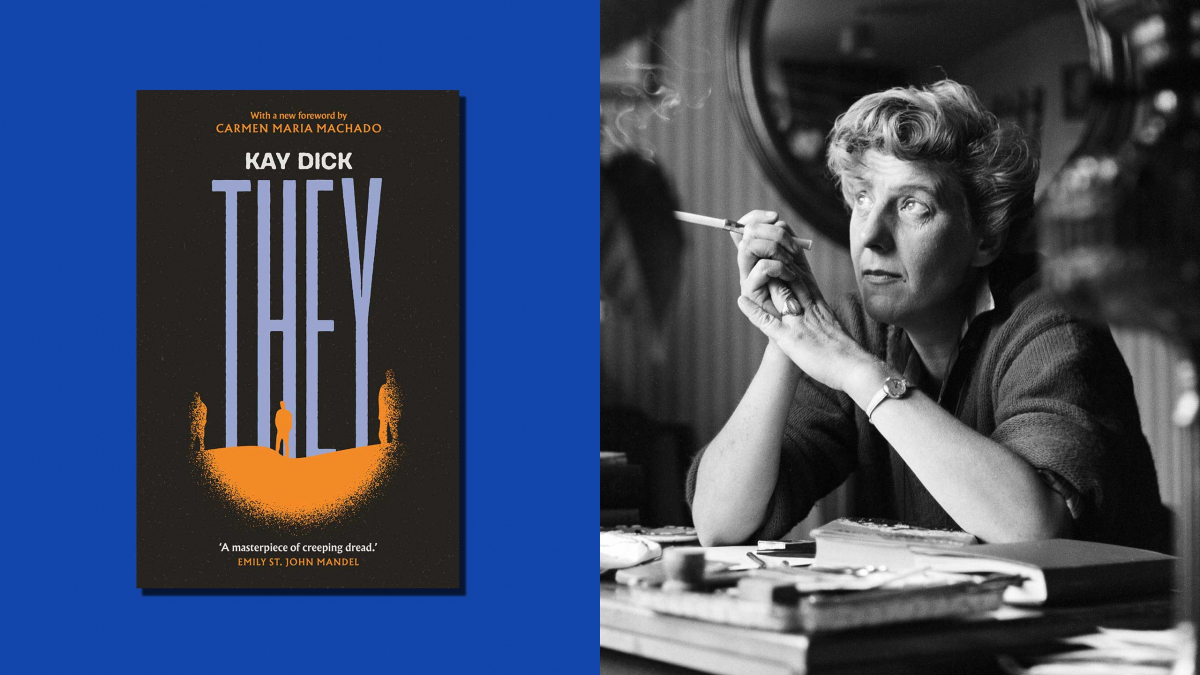
They by Kay Dick
(McNally US / Faber & Faber UK)
By the time the novelist Kay Dick published They in 1977, she hadn't unleashed a novel since 1962 when Sunday appeared. That had been heralded as the first in a sequence that stubornly failed to materialise, as did her projected biographies of Colette and Carlyle. Advances paid were returned to the publishers and she, bedevilled by writer's block, garnered a reputation as a troublesome force, as well as an unreliable one. Deadlines for reviews were missed, and she became an exacting and techy presence.
These flaws were assiduously detailed by her former friend Michael de la Noy (1934-2002) in his obituary for her published in The Independent, over which he was roundly castigated. Though not untrue it was a slanted, unfair affair. Peter Burton (1945-2011), the writer and editor, another of her friends turned acquaintance, confided he'd turned down the brief for fear of falling into the trap that de la Noy undoubtedly had. Dick published a final novel in 1982 The Shelf a dissection of a lesbian tryst, and after that a literary silence descended till her death in 2001.
They was not a commercial success, garnered a few cursory, if non-plussed reviews, won an obscure literary prize, and was remaindered within two years. It is easy to see why. The novel is like nothing else she'd previously published. Dick's books were generally thinly disguised fillets of her own history served as fiction. They arrived devoid of those expectations and that context. A cuckoo of a work in her literary nest.
Hard to categorise it has elements of nightmare and fable, but possesses a haunting directness, a beautiful brevity of style. Her language is crafted and direct, effortlessly pared into ten interlocking pieces, a nightmare delivered in prosaic terms.
The central figure is never identified, a genderless figment of the reader's choice who exists in a world where the arts are under siege and emotions percieved as a flaw and a curse. Books vanish. Galleries emptied. Art is destroyed, their creators arrested to be reprocessed and returned mindless and submissive to a bland and sterile existence. All this is the work of "they" who are never explained, merely mentioned as a threat, a dangerous force seen distantly. There are elements of sci-fi without a space-age backdrop, which is rural England whose pastoral elements have been imbued with aspects of menace. A chilling and dystopian fable. A sinister work of tremendous panache that has survived to find a belated, audience, it would make a claustrophobic and haunting movie.
Dick's vision smacks of the harnessing of her creative and emotional fears, her paranoia, and unease. The book is never abstract, but has an element of disconnect at its heart. On reflection, it is not without context when viewed agaist the early days of her career. It is forgotten that she was by the age of 26 in the 1940s, the first female head of a publishing house in the UK. Good friends with George Orwell, Dick was the mitigating force, as evidenced by his inscription in her copy of Animal Farm, in getting that work published. Orwell's influence permeates They and is therefore a novel imbued by personal association, albeit in a lost context. A lingering influence that wasn't considered relevant in the seventies.
This is a book that richly deserves its strange return journey of recognition. Discovered in a charity shop in Bath for fifty pence, it has travelled swiftly forwards for genuine and deserved rehabilitation. The subject of an intense bidding war by publishers, and with accolades from Margaret Atwood and Edna O'Brien, my guess remains were she around, Kay Dick's exacting requirements and demands would have stalled, or derailed her moment of rediscovery. I never met her but via her former partner, the novelist Kathleen Farrell 1912-1999 felt the tremors and witnessed the rumblings of her mercurial, insecure nature.
Hers is a life worthy of reassessment and with They that process has begun. A striking figure, prone to outbursts of charm and generosity, as well as awkwardness, she struck a poised stance with her monocle, tweeds, and cigarette holder. A friend to the poet Stevie Smith, the novelist Ivy Compton Burnett, an associaton that culminated in an illuminating book, she remains a glimmering filament from a glittering literary time.
